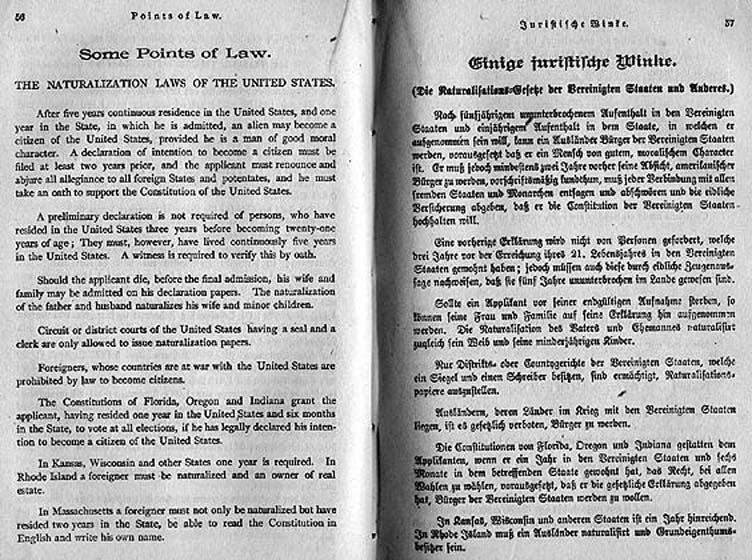
 |
 |
|
SOME POINTS OF LAW. THE NATURALIZATION LAWS OF THE UNITED STATES. After five years continuous residence in the United States, and one year in the State, in which he is admitted, an alien may become a citizen of the United States, provided he is a man of good moral character. A declaration of intention to become a citizen must be filed at least two years prior, and the applicant must renounce and abjure all allegiance to all foreign States and potentates, and he must take an oath to support the Constitution of the United States. A preliminary declaration is not required of persons, who have resided in the United States three years before becoming twenty-one years of age; They must, however, have lived continuously five years in the United States. A witness is required to verify this by oath. Shall the applicant die, before the final admission, his wife and family may be admitted on his declaration papers. The naturalization of the father and husband naturalizes his wife and minor children. Circuit or district courts of the United States having a seal and a clerk are only allowed to issue naturalization papers. Foreigners, whose countries are at war with the United States are prohibited by law to become citizens. The Constitutions of Florida, Oregon and Indiana grant the applicant, having resided one year in the United States and six months in the State, to vote at all elections, if he has legally declared his intention to become a citizen of the United States. In Kansas, Wisconsin and other States one year is required. In Rhode Island a foreigner must be naturalized and an owner of real estate. In Massachusetts a foreigner must not only be naturalized but have resided two years in the State, be able to read the Constitution in English and write his own name. (Continued on next page) In Vermont he must be naturalized, be a peaceable citizen and declare on oath, that he will give his vote as he may think best for the good of the State. Ignorance of the law will excuse no one. Notes, issued by a minor, are voidable. Notes, issued on Sunday, are void. Contracts made on Sunday are void, except in Illinois. Notes, dated ahead of their issue, are void but are valid if dated back. Notes signed with lead pencils, are valid. Notes may be written in any translatable language and even may not be dated. If the time is not specified they are payable on demand. Notes are not negotiable unless the words payable to order or bearer are written on them. Business houses are responsible for their agents. The act of one partner binds the others. Oral agreements are valid but must be proven by evidence. A hotel-keeper has a lien upon the personal effects of his guests; but he is responsible for the goods, if lost or stolen. The hotel-keeper is not responsible for money, jewels, and other valuables of his guests, if stolen, unless given to him for keeping in his iron safe. |
|
This Internet publication has been supported by a grant from The Equitable Foundation. |